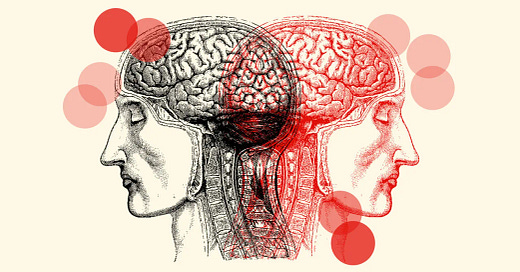Introduction
In recent decades, the global mental health crisis has intensified, with rates of anxiety, depression, and other psychological disorders skyrocketing. Mainstream discourse often attributes this crisis to individual pathology, emphasizing biological and genetic explanations. However, a growing body of research suggests that mental illness cannot be fully understood without situating it within the material conditions of capitalism. The increasing precarity of work, economic inequality, and alienation under late-stage capitalism have all contributed to today's widespread psychological distress. This article argues that the rise in mental illness is a direct consequence of worsening capitalist conditions, drawing from Marxist psychology, critical theory, and the works of Iain Ferguson, Frantz Fanon, and Ignacio Martín-Baró.
The Structural Roots of Mental Illness
Mainstream psychology and psychiatry have often depoliticized mental illness, framing it as an individual issue to be treated through medication and therapy. However, as Iain Ferguson (2023) argues in Politics of the Mind: Marxism and Mental Distress, psychological distress must be understood in relation to the material conditions of people’s lives. He critiques the dominant biomedical model for neglecting the social and economic determinants of mental health, arguing that neoliberal capitalism has intensified stress, alienation, and despair.
Economic insecurity is a key factor in this crisis. Studies have consistently linked poverty and precarious employment to mental health struggles. For instance, a study conducted by Silva et al (2018) found that individuals experiencing job insecurity had significantly higher rates of depression and anxiety (Silva et al., 2018). Similarly, the gig economy—often romanticized as flexible—has left workers without a stable income, healthcare, or labor protections, exacerbating psychological distress (Standing, 2011). Under capitalism, mental health is not simply an issue of individual brain chemistry but a product of systemic exploitation.
Beyond economic insecurity, the relentless demands of productivity and efficiency create conditions that fuel chronic stress. Capitalism forces individuals to commodify their time, labor, and even emotions, often requiring workers to suppress their distress to maintain employability. The normalization of overwork—seen in the glorification of “hustle culture” and the expectation of being constantly available—contributes to burnout and exhaustion.
Moreover, access to mental healthcare itself is stratified along class lines. While wealthier individuals can afford therapy, medication, and time off for self-care, working-class people are more likely to suffer without adequate treatment. The privatization of healthcare in capitalist societies reinforces this disparity, ensuring that mental illness remains a burden disproportionately borne by those most economically vulnerable. When the conditions that produce mental distress are intrinsic to the capitalist system, individual solutions—such as therapy or medication—can only provide temporary relief rather than address the root causes of suffering.
Alienation and the Capitalist Workplace
Karl Marx’s concept of alienation is central to understanding mental illness under capitalism. Marx describes how workers are alienated in four fundamental ways: from the product of their labor, from the act of production itself, from their fellow workers, and from their own human potential. This alienation manifests in widespread dissatisfaction, depression, and burnout, as workers find themselves trapped in an economic system that reduces them to mere instruments of production.
Alienation from the product of labor occurs because workers do not own what they create; instead, it becomes the property of capitalists. This disconnect fosters a sense of meaninglessness, as individuals spend their lives producing goods and services that do not benefit them directly. Alienation from the labor process itself arises when work becomes repetitive, monotonous, and devoid of creativity. Instead of being an expression of human potential, labor under capitalism becomes a dehumanizing routine, leading to feelings of emptiness and despair.
Furthermore, workers are alienated from each other, as capitalism fosters competition rather than solidarity. Instead of collaborating to improve their conditions, workers are pitted against one another in a struggle for scarce jobs, promotions, and wages. This isolation contributes to a breakdown of community and increases feelings of loneliness and depression. Lastly, alienation from one’s human essence occurs when labor is no longer a means of self-realization but rather a means of mere survival. As Marx argues, under capitalism, work does not affirm life—it diminishes it.
These forms of alienation have direct psychological consequences. The rise of “bullshit jobs”, as David Graeber famously coined, where workers feel their labor lacks purpose, only deepens this crisis. Instead of fulfilling meaningful social roles, many workers find themselves in positions that serve no real function other than to sustain the capitalist machine. This profound sense of purposelessness and disconnection from one’s labor is a key driver of the mental health crisis under capitalism, making Marx’s theory of alienation more relevant than ever.
Neoliberalism and the Individualization of Mental Distress
Neoliberal capitalism has not only worsened mental health conditions but has also reshaped how mental illness is understood and treated. The rise of the pharmaceutical industry and the dominance of cognitive-behavioural therapy (CBT) reflect a broader neoliberal trend: individualizing distress while obscuring systemic causes. Ferguson (2023) critiques this approach, arguing that it depoliticizes mental illness by treating it as an internal defect rather than a response to oppressive social conditions.
This individualized approach is reinforced by the self-help industry, which promotes the idea that mental distress can be solved through personal mindset shifts rather than structural change. The widespread adoption of mindfulness and resilience training in corporate settings exemplifies this trend. Instead of addressing the root causes of worker stress—such as low wages, job insecurity, and overwork—companies offer wellness programs designed to help employees "cope" with exploitation (Ehrenreich, 2009). By shifting responsibility onto individuals, capitalism evades accountability for the harm it inflicts.
Pharmaceutical interventions, while often necessary for managing severe mental illness, have also been co-opted into this neoliberal framework. Rather than addressing the root economic causes of distress, the medical industry profits from pathologizing suffering and selling pharmaceutical solutions. In this sense, neoliberalism not only creates the conditions for mental distress but also commodifies its treatment, reinforcing a cycle of systemic harm.
Furthermore, this framework pathologizes resistance and dissent. The medicalization of distress often frames anger, disillusionment, or exhaustion as personal failings rather than legitimate responses to systemic injustice. Those who struggle under capitalism are told to "work on themselves" rather than change their conditions, ensuring that collective organizing and radical action are suppressed in favour of individual adaptation. In this way, neoliberalism weaponizes psychology to sustain economic exploitation while discouraging systemic critique.
Colonialism, Racism, and Psychological Oppression
The relationship between capitalism and mental illness cannot be fully understood without addressing colonialism and racial oppression. Frantz Fanon, a psychiatrist and anti-colonial theorist, provides crucial insights into how capitalism and imperialism shape psychological suffering. In The Wretched of the Earth (1961), Fanon examines how colonial violence inflicts deep psychological wounds, leading to trauma, self-hatred, and internalized oppression among the colonized. He argues that mental illness among oppressed populations is inseparable from the material realities of racism and economic subjugation.
Ignacio Martín-Baró, a psychologist and liberation theologian, built on Fanon’s work, coining the term "psychosocial trauma" to describe the collective suffering imposed by oppressive systems (Martín-Baró, 1994). His work highlights how state violence, poverty, and structural inequality create conditions of chronic distress. In the contemporary world, racial capitalism continues to exacerbate these issues. Studies have shown that experiences of racism correlate strongly with higher rates of depression, anxiety, and post-traumatic stress disorder (PTSD) (Williams et al., 2018). These findings underscore the need for a materialist analysis of mental health—one that recognizes oppression as both a psychological and economic phenomenon.
Beyond direct colonial violence, the psychological legacy of historical trauma persists across generations. Indigenous communities, for example, continue to experience disproportionately high rates of suicide and substance abuse due to the lasting effects of land dispossession, cultural erasure, and systemic marginalization (Admin, 2021). Similarly, the prison-industrial complex disproportionately targets Black and brown populations, subjecting them to cycles of incarceration, police brutality, and economic disenfranchisement—factors that have been linked to severe mental health struggles (DeVylder et al., 2020). The pathologization of marginalized communities often obscures these systemic factors, blaming individuals rather than addressing structural harm.
Furthermore, racial capitalism ensures that access to mental health resources remains deeply unequal. While wealthy, predominantly white populations have greater access to therapy, medication, and psychiatric care, marginalized communities are more likely to be criminalized or neglected when experiencing mental distress. This disparity reflects the broader reality of capitalist healthcare systems, where profit dictates who receives care and who is left to suffer. Addressing mental health through a decolonial and anti-capitalist lens means recognizing that true healing cannot occur within the confines of a system that thrives on racial and economic oppression. Instead, liberation from capitalism and white supremacy is necessary for collective psychological well-being.
Conclusion: The Need for Structural Change
The rising rates of mental illness in capitalist societies are not accidental. They are the inevitable result of a system built on exploitation, alienation, and inequality. The prevailing mental health discourse, which emphasizes individual responsibility and biomedical explanations, obscures the structural roots of this crisis. As Ferguson (2023) argues, a truly emancipatory approach to mental health must challenge the socioeconomic conditions that produce distress rather than merely treating its symptoms.
Addressing the mental health crisis requires more than increased access to therapy or medication—it demands systemic change. Policies such as universal basic income, shorter workweeks, strong labor protections, and socialized healthcare could significantly improve mental well-being by reducing economic insecurity and workplace exploitation. However, these reforms alone will not dismantle the capitalist structures that generate psychological suffering. True liberation requires a radical reimagining of society—one that prioritizes human needs over profit.
As Fanon and Martín-Baró emphasized, mental health is inseparable from the struggle for justice. If we are to address the root causes of psychological distress, we must confront capitalism itself. Only by building a world free from exploitation and oppression can we hope to achieve true mental well-being
References
Admin. (2021, December 14). Suicide: Statistics for First Nations - Vancouver Island Crisis Society. Vancouver Island Crisis Society - Vancouver Island Crisis Society - Helping People Find Their Way. https://www.vicrisis.ca/statistics-2/#:~:text=First%20Nations%20People,-There%20were%20an&text=An%20estimated%201180%20people%20died,%2DIndigenous%20people%20(8.0).
DeVylder, J., Fedina, L., & Link, B. (2020). Impact of police violence on mental Health: A theoretical framework. American Journal of Public Health, 110(11), 1704–1710. https://doi.org/10.2105/ajph.2020.305874
Ehrenreich, B. (2009). Bright-sided: How Positive Thinking is Undermined America. Metropolitan Books.
Fanon, F. (1961). The wretched of the Earth. http://dx.doi.org/10.2307/20048263
Ferguson, I. (2023). Politics of the Mind (2nd Edition): Marxism and Mental Distress.
Martín-Baró, I. (1994). Writings for a Liberation Psychology. Harvard University Press.
Silva, M., Resurrección, D. M., Antunes, A., Frasquilho, D., & Cardoso, G. (2018). Impact of economic crises on mental health care: a systematic review. Epidemiology and Psychiatric Sciences, 29. https://doi.org/10.1017/s2045796018000641
Standing, G. (2011). The precariat: the new dangerous class. http://ci.nii.ac.jp/ncid/BB1835821X
Williams, M. T., Metzger, I. W., Leins, C., & DeLapp, C. (2018). Assessing racial trauma within a DSM–5 framework: The UConn Racial/Ethnic Stress & Trauma Survey. Practice Innovations, 3(4), 242–260. https://doi.org/10.1037/pri0000076







great article. gonna share it with my comrades ❤️
You've brilliantly diagnosed how capitalism doesn't just create individual trauma - it systematically prevents us from processing that trauma collectively, instead forcing us to either consume it as personal pathology or pass it down as inherited wounds. What strikes me is how this connects to something I call "unmetabolized memory" - when societies can't collectively process their pain, they build systems that perpetuate the very conditions that created the suffering in the first place.
If we truly want to heal the mental health crisis, shouldn't we be asking: How do we create systems that help communities metabolize trauma together instead of forcing individuals to carry societal wounds alone?